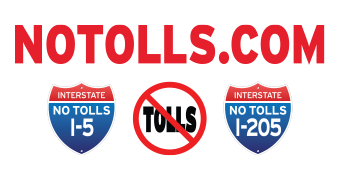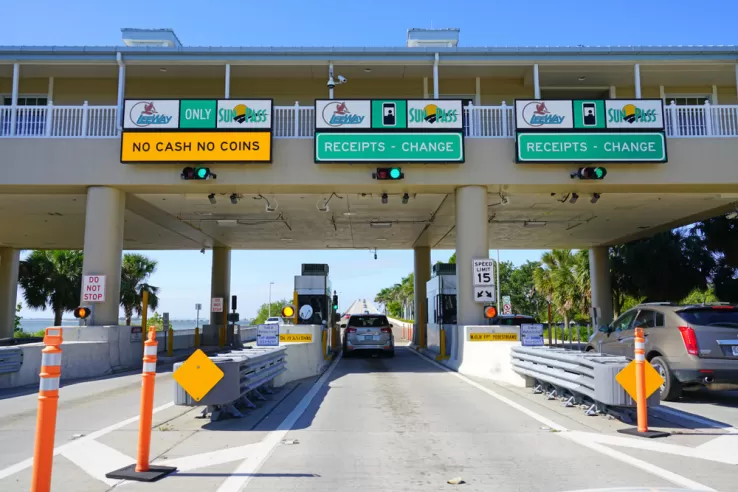Bay Area transportation planners are studying a radical idea to reduce traffic congestion and fund driving alternatives: tolling all lanes on a freeway. Even more radical, the plan considers tolling parallel roads.
The Bay Area’s newest express lanes, transportation jargon for a variably-priced toll lane that also permits carpoolers to use toll-free (aka HOT lanes) if properly equipped with a transponder or toll tag, became fully operational on March 3 on a 22-mile stretch of U.S. 101, less than a mile east of my home in Burlingame in San Mateo County.
One lane is dynamically priced, i.e., the toll is higher when congestion increase to keep traffic flowing at at a minimum of 45 mph, while the adjacent three or four lanes are unmanaged, subject to the ‘tragedy of the commons‘ outcome. But what if all lanes were tolled dynamically?
That improbable scenario, asking all non-carpool drivers to pay to drive on a freeway, is the topic of a two-year study convened by the Bay Area’s transportation planning agency, the Metropolitan Transportation Commission (MTC).
[Related post, Aug. 26, 2020: “Tolling All Freeway Lanes in the Bay Area?“]
“The Next Generation Bay Area Freeways Study will explore how pricing and other strategies could transform the Bay Area’s freeway network into a modern network with reliable transportation options,” according to its webpage.
- This planning study is a first step in identifying a roadmap to implement Plan Bay Area 2050’s Strategy. It looks to 2030 and beyond, and will consider tolling on congested freeways in areas that also have good public transportation options.
“Still in its early stages, an actual recommendation won’t come to light until winter 2024,” writes Ricardo Cano, who covers transportation for the San Francisco Chronicle, on March 9 in the source article.
- The goal, however, is clear: use the potential tolling fees to move people away from driving single-occupancy vehicles and drive less or use other transportation modes, such as transit.
The Chronicle shows [JPG] the three “potential pricing strategies,” called concepts:
- All-lane tolling on most Bay Area highways
- All-lane tolling on most Bay Area highways, plus adjacent arterials
- Congestion or cordon tolling in the region’s three major cities: San Francisco, Oakland and San Jose.
“MTC planners said the aim of the tolling is to reduce driving demand, not raise revenue, though they say the tolls could be used to pay for bolstered public transit service, as well as discounted toll fees for low-income drivers,” adds Cano.
- “Our study is identifying whether there are equitable and politically acceptable pathways centered on pricing toward a shared vision of next generation freeways,” said Anup Tapase, a principal planner at the MTC.
MTC Advisory Council’s cold reception
The notion of asking all freeway drivers, rather than reserving a single lane or two for carpoolers and toll-paying motorists who want a faster commute, has not gone over well with the public as well as the MTC Policy Advisory Council.
- Some committee members suggested the concept, however noble, is a nonstarter if it attempts to challenge the long-ingrained belief by many Californians that it should be a public right to drive on highways without paying a toll. And planners noted that much of the public feedback, so far, has viewed the tolls with hostility, likening them to yet another money grab.
- “Every driver who now drives on a freeway for free who starts having to pay a toll will regard that as a betrayal,” committee member Frank Welte said. “And that driver will react at the polls in ways that will be very disruptive toward society.”
Radical, maybe. But not unprecedented.
Converting a single lane on a public freeway to a toll lane is no easy task. Converting the entire freeway to a tollway is Herculean. Two examples come to mind.
- The best example is the 66 Express Lanes inside the Beltway in northern Virginia. However, they operate as HOT lanes only during commute times, inbound to the District of Columbia in the morning, and outbound during the afternoon commute. Planetizen has covered these lanes extensively as they “operate like no other public roadway, let alone interstate, in the United States.”
- Oregon’s Regional Mobility Pricing Project, not to be confused with Oregon’s Interstate 205 toll project which is focused on tolling two bridges for seismic retrofit.
See the Oregon Department of Transportation’s Urban Mobility Office for clarification. Additional reading: “Tolls are coming to Portland-area freeways, and even tolling fans worry they’ll stack up,” The Oregonian, Feb. 11, 2023.
Unlike the Bay Area road pricing study, the Portland metro area project has the backing of landmark state transportation funding legislation (see past posts tagged HB 2017 and Portland Metro Area Value Pricing Advisory Committee.
Hat tip to Matt Williams.
FULL STORY: One plan to fix Bay Area traffic congestion: A toll for driving on the region’s highways


